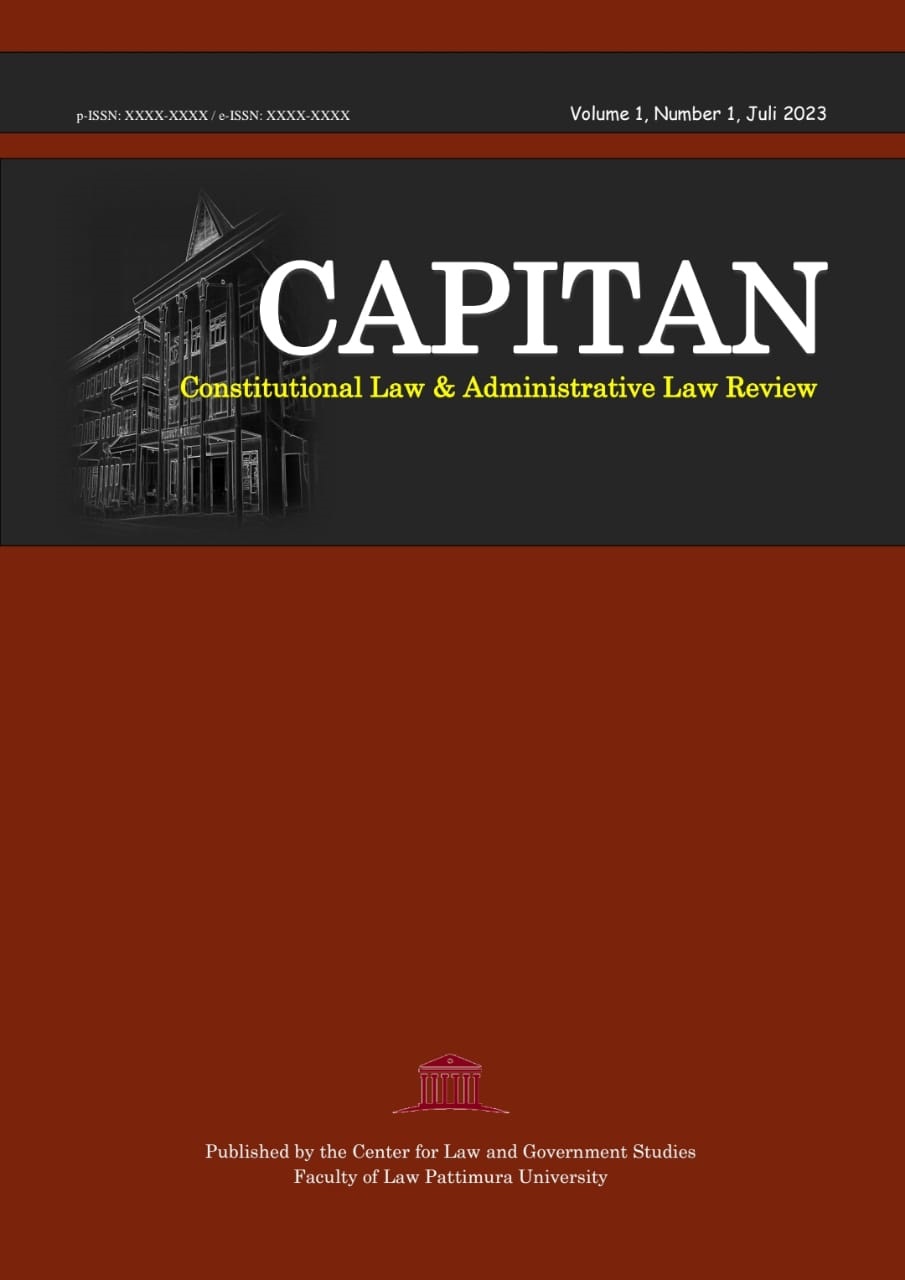Penetapan Tarif Pajak Penghasilan Dalam Transaksi Jual Beli E-Commerce
Abstract
Income tax rates need to be regulated in an appropriate regulation in order to emphasize the imposition of income tax on those who carry out e-commerce buying and selling transactions, so that income tax is imposed fairly. So, levying income tax on e-commerce buying and selling transactions is the state's obligation to impose it on entrepreneurs who carry out e-commerce buying and selling transactions. The type of research that will be carried out in this writing is legal research with a normative juridical or analytical descriptive approach. Normative legal research is a type of legal research that involves an internal perspective with a focus on legal norms as the research object. When e-commerce tax collection rules are also applied to e-commerce buying and selling transactions, there will be no social inequality or movement of entrepreneurs in the e-commerce sector. Based on Minister of Finance Regulation Number 210 of 2018, the obligation to treat income tax like conventional traders is not mentioned at all. This regulation has caused problems and rejection from the Indonesian e-commerce association (idea) because it does not create a level playing field/fairness.
Downloads
References
Anisa Nurpratiwi, Muhammad Saifi dan Otto Budihardjo, “Analisis Persepsi Wajib Pajak Pemilik Umkm Terhadap Penetapan Kebijakan Pajak Penghasilan Final Sesuai Peraturan Pemerintah No. 46 Tahun 2013 (Studi Pada Kpp Pratama Malang Utara),” Skripsi, Program Studi Perpajakan, Jurusan Administrasi Bisnis, Fakultas Ilmu Administrasi, Universitas Brawijaya, 2013.
Atep Adya Barata, Panduan Lengkap Pajak Penghasilan, Cianjur: Visi Media Meretas Generasi Pajak, 2011.
Bagus Hanindyo Mantri, “Perlindungan Hukum Terhadap Konsumen Dalam Transaksi E-Commerce,” Tesis, Magister Ilmu Hukum Universitas Diponegoro 2007.
Debora Natalia Watung, “Analisis Perhitungan Dan Penerapan Pajak Penghasilan Pasal 21 Serta Pelaporannya,” Jurnal Embe, Vol. 1, (2013).
Erly Suandy, Hukum Pajak, Jakarta: Salemba Empat Edisi 5, 2011.
Erly Suandy, Hukum Pajak, Jakarta: Salemba Empat, 2020.
Hamidah, dkk, Perpajakan, Batam: Yayasan Cendekia Mulia Mandiri, 2023.
Imam Mustofa, “Transaksi Elektronik (E-Commerce) Dalam Perspektif Fikih,” Jurnal Hukum Islam (JHI) Vol. 10, no 2 (2012).
Inas Syadza Wafikhoh, “Pengecualian Objek Pajak Penghasilan Wajib Pajak Badan Atas Dividen,” Jurist-Diction, Vol. 5, no 2, (2022).
John Hutagaol, Perpajakan Isu-Isu Kontemporer, Yogyakarta: Graha Ilmu, 2007.
Mardiasmo, Perpajakan, Yogyakarta: Cv Andi Offset, 2009.
Marselina Hamijaya, “Pengaruh Insentif Pajak dan Non Pajak Terhadap Manajemen Laba Saat Terjadi penurunan Tarif Pajak Penghasilan Badan Pada Perusahan Manufaktur Yang Terdaftar di Bursa Efek Indonesia,” Jurnal Akuntasi Bisnis, Vol. XIV, no 27, (2015).
Muhammad Irham et al., “the study of state administration builds the personality of a president with noble morals through islamic teaching instruments in Indonesia," Journal of Legal, Ethical and Regulatory Issues Vol. 24, no. 1s (2021), p. 2. https://www.abacademies.org/articles.
Sinta Aprilia Putri Anggraini, Levi Martantina, Dan Diah Anugrah Sharasanti, “Implementasi Perhitungan Pajak Penghasilan Atas Transaksi E-Commerce Pada Dearsi Toserba Kabupaten Tuban,” Jurnal Akutansi Dan Pajak, (2024).
Siti Chairana Nurmecca, “Aspek Hukum Pemungutan Pajak Penghasilan Dari Transaksi Jual Beli Melalui Media Sosial,” Skripsi, Fakultas Syariah Dan Hukum Universitas Islam Negeri Syarif Hidayatullah, Jakarta, 2020.
Siti Resmi, Perpajakan Teori Dan Kasus, Jakarta: Salemba Empat, Edisi 6, Buku 1, 2011.
Westi Riani dan Sigit Haryadi, “Metode Penetapan Tarif Pajak Penghasilan Yang Berkeadilan,” Prosiding SNaPP2017 Sosial, Ekonomi dan Humaniora, Bandung, 2017.
Wira Sakti, Nufransa, Pintar Pajak E-Commerce, Jakarta: Visi Media, 2014.
Yopi Riszcy Loupatty, “Perlindungan Hukum Bagi Selebgram Dalam Perpajakan di Indonesia”, Skripsi Ilmu Hukum, Universitas Pattimura, Ambon 2021.
Copyright (c) 2024 Absa Brian Lesiyela, Heillen Martha Yosephine Tita (Author)

This work is licensed under a Creative Commons Attribution-NonCommercial 4.0 International License.
Authors who publish their manuscripts in this Journal agree to the following conditions:
- The copyright in each article belongs to the author, as well as the right to patent.
- Authors are able to enter into separate, additional contractual arrangements for the non-exclusive distribution of the journal's published version of the work (e.g., post it to an institutional repository or publish it in a book), with an acknowledgment of its initial publication in this journal.
- Authors are permitted and encouraged to post their work online (e.g., in institutional repositories or on their website) prior to and during the submission process, as it can lead to productive exchanges, as well as earlier and greater citation of published work.
- Authors have the right to self-archiving of the article (Author Self-Archiving Policy)













